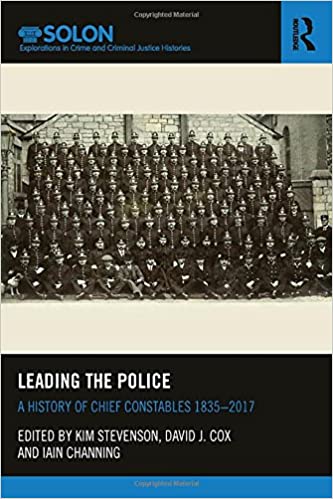In 2015 the College of Policing published its Leadership Review with specific reference to the type of leadership required to ensure that the next generation of Chief Constables and their management approach will be fit for purpose. Three key issues were highlighted as underpinning the effective leadership and management of contemporary policing: hierarchy, culture and consistency. Yet these are not just relevant to modern policing, having appeared as constant features, implicitly and explicitly, since the creation of the first provincial constabularies in 1835.
This collection reviews the history of the UK Chief Constable, reflecting on the shifts and continuities in police leadership style, practice and performance over the past 180 years, critiquing the factors affecting their operational management and how these impacted upon the organization and service delivery of their forces. The individuality of Chief Constables significantly impacts on how national and local strategies are implemented, shaping relationships with their respective communities and local authorities. Importantly, the book addresses not just the English experience but considers the role of Chief Constables in the whole of the United Kingdom, highlighting the extent to which they could exercise autonomous authority over their force and populace.
The historical perspective adopted contextualises existing considerations of leadership in modern policing, and the extensive timeframe and geographical reach beyond the experience of the Metropolitan force enables a direct engagement with contemporary debates. It also offers a valuable addition to the existing literature contributing to the institutional memory of UK policing. The contributors represent a range of disciplines including history, law, criminology and leadership studies, and some also have practical policing experience.
چکیده فارسی
در سال 2015، کالج پلیس بررسی رهبری خود را با اشاره خاص به نوع رهبری مورد نیاز برای اطمینان از اینکه نسل بعدی فرماندهان پلیس و رویکرد مدیریتی آنها برای هدف مناسب هستند، منتشر کرد. سه موضوع کلیدی به عنوان زیربنای رهبری و مدیریت مؤثر پلیس معاصر برجسته شد: سلسله مراتب، فرهنگ و سازگاری. با این حال، اینها فقط مربوط به پلیس مدرن نیستند، زیرا از زمان ایجاد اولین پاسبانی استانی در سال 1835، به طور ضمنی و صریح به عنوان ویژگی های ثابت ظاهر شده اند.
این مجموعه تاریخچه فرمانده پلیس بریتانیا را مرور میکند و تغییرات و تداوم در سبک رهبری، عملکرد و عملکرد پلیس در 180 سال گذشته را بازتاب میدهد و عوامل مؤثر بر مدیریت عملیاتی آنها و چگونگی تأثیر آنها بر سازمان و ارائه خدمات آنها را نقد میکند. نیروها فردیت فرماندهان پلیس به طور قابل توجهی بر نحوه اجرای استراتژی های ملی و محلی تأثیر می گذارد و روابط با جوامع مربوطه و مقامات محلی آنها را شکل می دهد. نکته مهم این است که این کتاب نه تنها به تجربه انگلیسی می پردازد، بلکه به نقش فرماندهان پلیس در کل بریتانیا نیز می پردازد و میزانی را که آنها می توانند بر نیرو و جمعیت خود اعمال قدرت کنند، برجسته می کند.
دیدگاه تاریخی اتخاذ شده، ملاحظات موجود در مورد رهبری در پلیس مدرن را مورد توجه قرار می دهد، و چارچوب زمانی و محدوده جغرافیایی گسترده فراتر از تجربه نیروی متروپولیتن، امکان درگیری مستقیم با بحث های معاصر را فراهم می کند. همچنین افزودنی ارزشمندی به ادبیات موجود ارائه می دهد که به حافظه نهادی پلیس بریتانیا کمک می کند. مشارکتکنندگان طیفی از رشتهها از جمله تاریخ، حقوق، جرمشناسی و مطالعات رهبری را نشان میدهند، و برخی نیز تجربه عملی پلیسی دارند.
ادامه ...
بستن ...
ISBN-13: 978-1138217249
ISBN-10: 1138217247
ادامه ...
بستن ...










